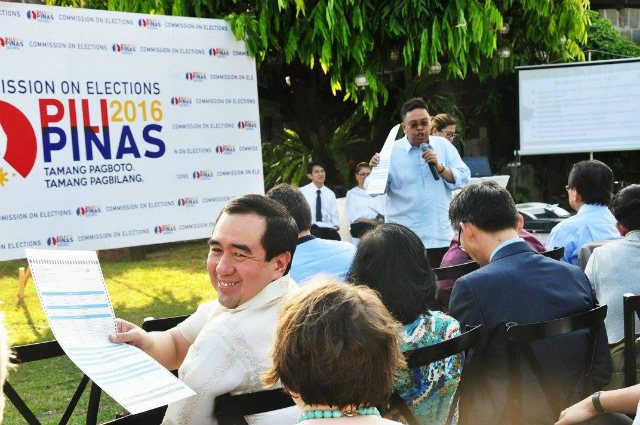SUMMARY
This is AI generated summarization, which may have errors. For context, always refer to the full article.

MANILA, Philippines – Despite objections from two election commissioners, a former election official, and a poll watchdog, the Commission on Elections (Comelec) decided to still issue replacement ballots in the May 9 polls.
Comelec Chairman Andres Bautista on Wednesday, April 27, said the poll body did a “re-voting” on replacement ballots after drawing flak for this rule.
Under its amended rules, the Comelec allows voters to get replacement ballots if, through no fault of their own, vote-counting machines (VCMs) reject their original ballots.
The Parish Pastoral Council for Responsible Voting (PPCRV), among others, said other voters might lose their chance to vote if the poll body runs out of ballots because of this rule.
Comelec Commissioners Christian Lim and Sheriff Abas, and former commissioner Gregorio Larrazabal also opposed this ballot replacement rule because of possible disenfranchisement in the May 9 polls.
Critics of the rule said, too, that the Comelec has no specific guidelines on when to issue replacement ballots.
Bautista however said on Wednesday: “Doon sa replacement ballots, magbibigay pa rin ng replacement ballot kapag hindi kasalanan ng botante na hindi tinanggap ng makina ‘yung kanyang balota.”
(On the replacement ballots, we will still give replacement ballots if it is not the voter’s fault that the machine didn’t accept his or her ballot.)
Only 1 replacement ballot each
The difference now is, the poll body will limit the replacement ballots it will issue to voters.
“You’re only entitled to one replacement ballot,” Bautista said.
The elections chief added that the Comelec has specified the guidelines for issuing replacement ballots.
“Meron ding ilalagay na wording na, basta maipakita niya na he did not intentionally deface or mark the ballot, parang hindi niya kasalanan, ‘yung hindi niya sinadya para magkaroon ng replacement ballot,” Bautista said.
(We’ll include a wording that says, “as long as he shows that he did not intentionally deface or mark the ballot, that it is not his fault, that he did not deliberately do it to get a replacement ballot.”)
Explaining the ballot replacement rule, Bautista earlier said he was thinking of the welfare of voters whose ballots get rejected through no fault of their own.
On the other hand, Abas warned that the ballot replacement rule might lead to the running out of ballots, which “will ultimately disenfranchise voters.”
Abas said that in the Autonomous Region in Muslim Mindanao, for instance, the voter turnout in certain areas was “close to a hundred percent” in “numerous instances.
He cited the voter turnout in the following areas in the 2013 elections:
- Datu Odin Sinsuat, Maguindanao – 99.46%
- Talayan, Maguindanao – 99.38%
- Picong, Lanao del Sur – 99.14%
Bautista, who proposed this new rule, earlier said that because the poll body does not expect a 100% voter turnout, it believes there will be spare ballots that can be used as replacement ballots.
In the Philippines’ last presidential elections held in 2010, for instance, voter turnout was 75%. – Rappler.com
Add a comment
How does this make you feel?
There are no comments yet. Add your comment to start the conversation.